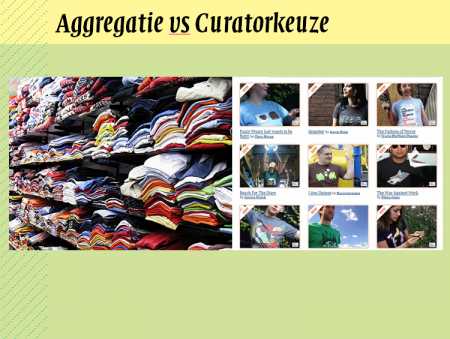De afgelopen dagen hadden iets weg van de laatste jaren organisatie Dutch Bloggies. Een hoop gedoe. Meningen die over en weer vliegen, fitties, halve en hele waarheden en een verkeerd gequote juryvoorzitter. Mijn agenda liet het niet toe om eerder een wat grotere uiteenzetting te geven over mijn achtergronden, mening en gedachten bij alls wat…
De 5 Bloggers van het Decennium
Vandaag is definitief de stekker getrokken uit de organisatie van de Dutch Bloggies. Eerlijk gezegd voelde ik het al een tijdje aankomen dat de jaarlijkse blogprijs dit jaar geen nieuwe editie zou zien. Te lang bleef het stil vanuit de organisatie en traditiegetrouw waren de eerste berichten voor een nieuwe editie nu wel de digitale…
Social media? Het gaat om de mentaliteit, niet om het middel
Blogs blijven relevant. Of het nu een persoonlijk blog is waarin iemand duiding geeft aan zijn (professionele of priv) omgeving, of het een online magazine is wat blogsoftware gebruikt of een afdeling die rondom een project de voortgang bijhoudt, blogging als activiteit zal niet meer weggaan. Evenals het idee achter Twitter niet meer zal verdwijnen…
Mooi tagging experiment op de Hogeschool Utrecht
Op de Hogeschool Utrecht begint Yammer langzaam een grotere rol te krijgen in de communicatie tussen medewerkers, dwars door alle organisatielijnen en fysieke beperkingen heen. Zo kwam ik op een thread terecht waarin werd aangekondigd dat er zou worden geëxperimenteerd met live tagging in colleges. Met een mobiele of webapplicatie kunnen studenten tijdens het college…
Wiki Bloghelden tijdelijk gesloten
Toen ik aan mijn boek Bloghelden begon was het eerste wat ik deed een domeinnaam regelen, website starten en een wiki openen. Dat laatste was voornamelijk omdat ik me al snel besefte dat ik niet alles alleen zou kunnen en dat een hoop materiaal het boek niet zou halen. De wiki was een extra platform…
Hoe je als bedrijf op Facebook actief kunt zijn: AVG
Elke computer moet een anti-virusprogramma hebben. Eigenlijk zouden mobiele telefoons en tablets die ook moeten hebben, maar dat is voor een andere keer. Ik wil het kort over mijn favoriet anti-virus programma hebben: AVG. Het is een gratis anti-virus en beschermingsprogramma en het biedt me al een aantal jaar de veiligheid als ik online ben.…
Het verschil tussen passie en zoekresultaten
Soms heb je zo’n dag dat je een paar briljante sites tegenkomt. Vanwege de inhoud, het enthousiasme wat van het scherm af spat. Helaas heeft zo’n dag ook zijn mindere momenten, waardoor je op andere blogs komt die wat minder spatten van de passie. Ik zou er een flinke verhandeling over te schrijven maar ik…
De ideeën voor 7inchmagazine.nl
Nu 7inchmagazine.nl loopt en de nieuwe blogger Ruben Steeman (u weet wel, van Buro RuSt, wiens vriendin dat mooie boek Bloghelden maakte) het stokje overneemt van me, verschijnt er een video op de campagnesite. Met moi in de hoofdrol. Best een mooi filmpje geworden! En de cameraman heeft het niet-werkende videobellen er mooi uitgeknipt. Bleek…
Influencers, de film
Zojuist heb ik de 13 minuten durende video “Influencers” gekeken. Een korte documentaire, gebaseerd in New York, waar creatieven uit diverse invalshoeken (muziek, design, mode) wordt gevraagd wat volgens hen Beïnvloeders zijn, hoe ze anderen beïnvloeden, welke krachten er aan het werk zijn en hoe deze beïnvloeders door de tijd heen trends bepalen en de…
De kortzichtige blik van de stuurlui aan wal
Ik ben op veel vlakken net zo veel n van de stuurlui als elk ander. Maar na de afgelopen weken moet me echt iets van het hart. Ik heb vorige week de film The Social Network gezien, samen met 30 bij elkaar gesprokkelde Facebook contacten. Dat klinkt denigrerend maar dat is het geenszins! Het was…
The Johnny Cash Project – Crowdsourcing Classic
Het Johnny Cash project is nog in volle gang maar wat mij betreft nu al een klassieker. Niet omdat ik een Johnny Cash fan ben (nou ja een beetje) maar de enorme mogelijkheden die je hebt op de site. Wat is het verhaal? Cash heeft in zijn nadagen een aantal prachtige CD’s achtergelaten onder de…
Contacten online synchroniseren, het blijft lastig!
Met mijn nieuwe Galaxy Tab kan ik schijnbaar bellen. Zoals ik al in de review op Lifehacking zeg, ik ga niet met zo’n broodplank aan mijn oor lopen, maar ik moet het toch op zijn minst even testen. Toen ik de simkaart uit mijn iPhone in de Tab stopte begon het gedonder. Op de simkaart…
Literaire tattoos – Dat boek wil ik!
Afgelopen donderdag schreef ik over de sterfdag van Jack Kerouac. Het beeld wat ik er bij plaatste was overduidelijk een tattoo. De laatste paragraaf van On the road met inkt vereeuwigd op de rug van een fan. Het beeld komt van een artikel over een nieuw boek: The Word made Flesh – Literary Tattoos from…
Een Samsung Galaxy Tab, maar waarom?
Yeah baby! Ik heb er 10 jaar lang me de pleuris voor moeten bloggen, netwerkborrelen, twitteren, social-media-en, presenteren en workshoppen maar eindelijk begint het dan door te dringen. In navolging van Henk-Jan’s post (en WAT een briljante vormgeving heeft die blog, check check check dat!) kan ik nu wel wat meer uit de doeken doen…
Waarom Jack Kerouac belangrijk is voor me
Vandaag is het de sterfdag van de Amerikaanse schrijver Jack Kerouac. Deze auteur, meest bekend om zijn boek On The Road, zou een invloedrijk persoon worden in de Beat Generation van de jaren ‘60. Ik las On the Road toen ik 17 was en het is nog altijd n van mijn favoriete boeken. Ik kan…
Help Bits of Freedom in 1 dag aan 1000 donateurs
Ik heb hier al vaker geschreven over Bits of Freedom, een Nederlandse organisatie die me aan het hart gaat omdat ze opkomen voor de vrijheid op het internet. Je kunt beargumenteren dat we allemaal mogen zeggen wat we willen op het web, maar ondertussen zijn er steeds meer (politieke) geluiden die er voor zorgen dat…
Is Twitter verslavend? Of zijn de media verslaafd?
Ik kreeg vandaag een mail van een journalist. Ze had me een paar keer gebeld (maar ja, ben op vakantie, dus telefoon niet constant bij me) en ze zat niet op Twitter (haar eigen woorden) dus probeerde ze het via mail. Ze wilde me interviewen voor Trouw voor een artikel over Twitterverslaving. Ik heb een…
Aan de slag met een nieuwe gadget!
Vorige week kreeg ik een leuk mailtje. Of ik interesse heb om een nieuwe gadget te proberen. Veel mensen reageren verbaasd als ik zeg dat ik geen iPad heb en geen hardcore Mac gebruiker ben. En met deze nieuwe gadget wordt het niet echt beter… Ik typ deze blogpost op de Samsung Galaxy Tab, een…
Hoe Microsoft lokatie een onderdeel van gaming maakt
Ik krijg vandaag van een van mijn studenten (ik doceer bij de opleiding Communicatie & Media Design) een fraai voorbeeld hoe mobile en location based onderdeel uit kunnen maken van een nieuw spel op de Xbox console. Microsoft komt binnenkort met het spel Fable III en in aanloop daarvan zijn ze een pervasive game Fable…
Read it Later. En deel het dan.
RSS heeft voor mij definitief afgedaan. Ik heb nog wel een Netvibes-dashboard als startpagina met wat standaard nieuwsfeeds (Techcrunch, Techmeme, Mediagazer, etc) maar echt een RSS-reader gebruiken, dat doe ik niet meer. Ik merk dat ik erg gehecht ben geraakt aan Read it Later (@ReaditLater op Twitter). Omdat het zo handig werkt en wel op…
De werkelijke kosten van Gratis…
Het is al weer anderhalve week terug dat ik een ochtend op Picnic kon zijn om Cory Doctorow te interviewen. De science fiction schrijver was op het festival om te spreken over onder andere de problemen rondom DRM (Digital Rights Management) en het online publiceren en verspreiden van content. In zijn presentatie vertelt Doctorow zijn…
Battle of the Curation apps #1 – Storify
Zoals ik al beloofde in mijn eerdere post zou ik een aantal van de nieuwe applicaties rondom verhalenbeheer/curation/storytelling/verzamelingen (ik ben er nog steeds niet uit) gaan testen en de mogelijkheden, voor- en nadelen op een rij zetten. Ik begin vandaag met Storify en maak gebruik van de berichten rondom de krakersrellen vrijdagavond in Amsterdam. Mijn…
Hoe Seats2Meet waarde haalt uit een ongrijpbaar netwerk
Zo nu en dan ben ik te vinden bij Seats2Meet, het vergadercentrum op Hoog Catharijne in Utrecht. De lobby van dit centrum is in een paar jaar tijd omgetoverd in een bruisend centrum van ZZP’ers en ondernemers die gebruik kunnen maken van een aantal faciliteiten. Gebruik van Wifi, koffie, thee en de fabuleuze lunch is…
Nieuw op de site:Een Over Jullie pagina
Geïnspireerd door een blogpost van David Armano heb ik een nieuwe pagina toegevoegd aan de site, een Over Jullie pagina. Want als het web gaat over delen, interactie, conversatie en reciprociteit, waarom dan op mijn site geen speciaal plekje reserveren voor iedereen die dagelijks, wekelijks, periodiek hier komt? Natuurlijk heb ik een Over Mij pagina…
Wat is het verschil tussen verzamelen en beheren?
De afgelopen dagen is er een interessante ontwikkeling geweest op het gebied van online curation, waar ik hier en hier al eens over schreef. Tijdens het Techcrunch Disrupt congres zijn een aantal nieuwe diensten gepresenteerd die in dit thema duiken en instrumenten bieden om de digitale naald in de hooiberg te vinden. Natuurlijk springen velen…

